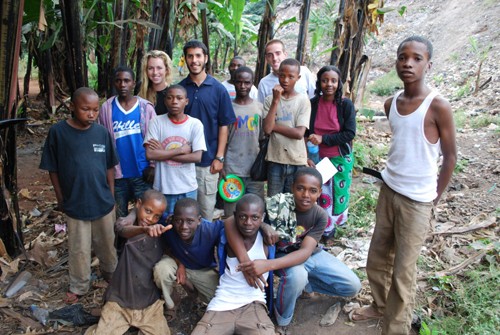In mid-September a new club was recognized — Support for International Change — a branch of a non-government organization based in Tanzania that promotes HIV and AIDS education and testing in northern Tanzania.
Rachel Sampson, the club’s treasurer and interdisciplinary studies junior, said the club’s goal is to raise $1,000 through fundraisers and different events. The money they earn will be donated to the children in Tanzania and go toward doctor visits and healthcare.
She said every summer there are participants from this program who come to the UA and teach others about their experience.
She spent two months in Tanzania living with a host family and spreading AIDS awareness this past summer.
“”After I have seen how others live, I have realized how much more there is to do to help them,”” Sampson said.
She said she always wanted to go to Africa and, having an interest in HIV education, she wants everyone to know how to protect themselves.
“”It’s like a study abroad experience, but it gives you so much more life experience by volunteering,”” Sampson said. “”You are more like a member of the community, not a tourist and get to teach people what we perceive is common knowledge. That is, its so useful to their daily lives.””
She said currently the club is looking to recruit volunteers for summer and fall 2010 programs to travel to Tanzania.
Any major is welcome and no prior HIV/AIDS knowledge or foreigh language skills are needed.
Vice president Adam Rubin, a political science senior, said he was spurred to action after realizing the dire state UA lacked HIV/AIDS awareness abroad.
Rubin said the club addresses issues of global poverty, environmental problems, foreign conflicts, hunger and a variety of other issues.
“”Its purpose is to give college students a voice and raise awareness of these issues through different creative outlets,”” he said.
A few members traveled to Tanzania over the summer he said to support for international change, working in a rural area for eight weeks.
During this time they met a group of street children — 15 young boys — living in a garbage dump behind the local marketplace, with inadequate shelter and little food to eat.
“”It was visually shocking to see the conditions they were living in,”” Rubin said.
Tumaini Raymond, a young Tanzanian woman from Arusha, worked as teacher in town and was the one who found these children in 2007 and has tried to help them since.
Rubin said while group members were there, they took the children to health clinics, bought them food, gathered clothing and worked to educate them.
He said they would teach elementary Swahili, basic English, reading and writing for four weeks behind the marketplace.
Rubin said he was told that half of these children were orphans, the other half were considered children of the street.
He remembers developing a close relationship with one of the children, Hahim, an orphan who would repeatedly ask when Rubin would return to visit him.
He hopes to make a documentary of his experience and impact the lives of other people who have an interest in experiencing what he did.
While the club focused on Africa this semester, its goal is to work in a different region every semester, he said.
“”I have received such global insight,”” Rubin said. “”It is one thing to research a situation and make a presentation on it and another to see it front of you, and being able provide services for them and build relationships.””
Dr. Wayne Decker, the head of the honors college and faculty advisor said, Support for International Change is unlike a lot of programs at the UA in that it has a serious preparation session on health and AIDS so students can be knowledgeable on the subject and can benefit people overseas.
Decker said several of his students have been involved in both leadership and participant roles and gotten a lot out of the program.
“”The thing about working in Africa is it really taxes everything about a person,”” Decker said. “”You need intellect, patience, stamina, good people skills and some courage every now and then.””









